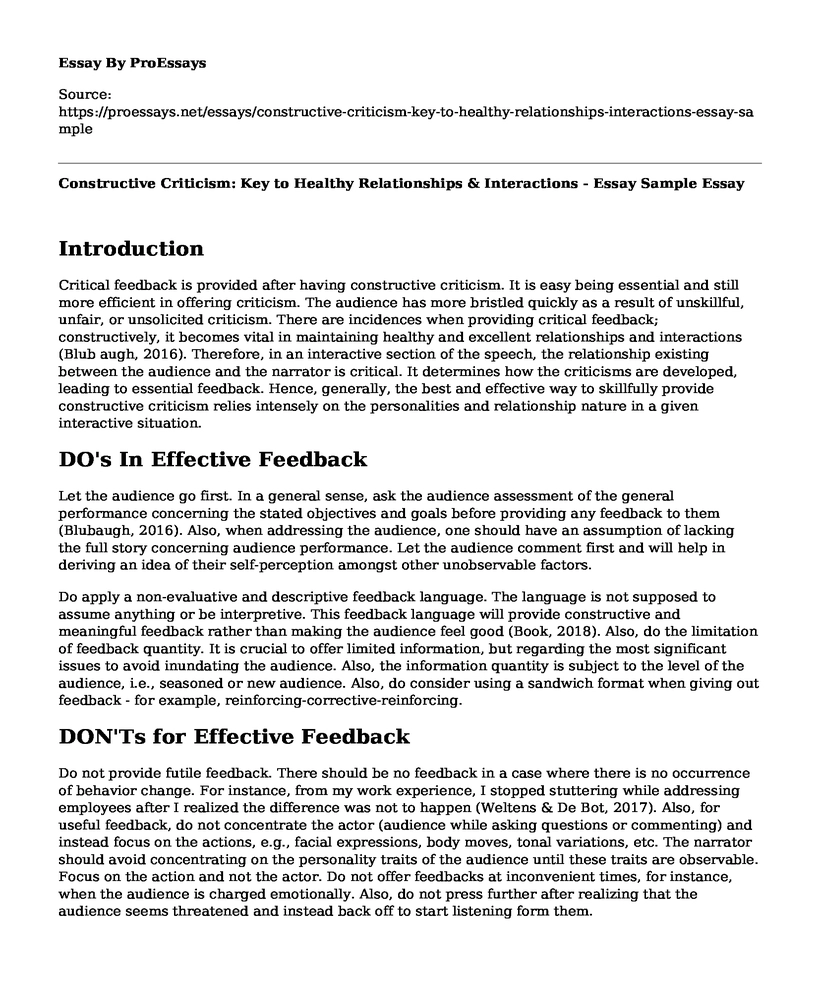Introduction
Critical feedback is provided after having constructive criticism. It is easy being essential and still more efficient in offering criticism. The audience has more bristled quickly as a result of unskillful, unfair, or unsolicited criticism. There are incidences when providing critical feedback; constructively, it becomes vital in maintaining healthy and excellent relationships and interactions (Blub augh, 2016). Therefore, in an interactive section of the speech, the relationship existing between the audience and the narrator is critical. It determines how the criticisms are developed, leading to essential feedback. Hence, generally, the best and effective way to skillfully provide constructive criticism relies intensely on the personalities and relationship nature in a given interactive situation.
DO's In Effective Feedback
Let the audience go first. In a general sense, ask the audience assessment of the general performance concerning the stated objectives and goals before providing any feedback to them (Blubaugh, 2016). Also, when addressing the audience, one should have an assumption of lacking the full story concerning audience performance. Let the audience comment first and will help in deriving an idea of their self-perception amongst other unobservable factors.
Do apply a non-evaluative and descriptive feedback language. The language is not supposed to assume anything or be interpretive. This feedback language will provide constructive and meaningful feedback rather than making the audience feel good (Book, 2018). Also, do the limitation of feedback quantity. It is crucial to offer limited information, but regarding the most significant issues to avoid inundating the audience. Also, the information quantity is subject to the level of the audience, i.e., seasoned or new audience. Also, do consider using a sandwich format when giving out feedback - for example, reinforcing-corrective-reinforcing.
DON'Ts for Effective Feedback
Do not provide futile feedback. There should be no feedback in a case where there is no occurrence of behavior change. For instance, from my work experience, I stopped stuttering while addressing employees after I realized the difference was not to happen (Weltens & De Bot, 2017). Also, for useful feedback, do not concentrate the actor (audience while asking questions or commenting) and instead focus on the actions, e.g., facial expressions, body moves, tonal variations, etc. The narrator should avoid concentrating on the personality traits of the audience until these traits are observable. Focus on the action and not the actor. Do not offer feedbacks at inconvenient times, for instance, when the audience is charged emotionally. Also, do not press further after realizing that the audience seems threatened and instead back off to start listening form them.
At the workplace, I have received several feedbacks from the administration. For instance, the manager commented on a tremendous improvement in the domain. He also said on how I have improved in reporting to work. This feedbacks were after an interactive speech he had previously addressed all employees in a general meeting (Weltens & De Bot, 2017). At the same, I have given several feedbacks at my workplace; for instance, I have commented on general improvement on the general performance of the company after a reshuffling of the employees.
References
Blubaugh, J. (2016). Effects of positive and negative audience feedback on selected variables of speech behavior. Speech Monographs, 36(2), 131-137. doi: 10.1080/03637756909375619
Book, C. (2018). Providing feedback: The research on effective oral and written feedback strategies. Central States Speech Journal, 36(1-2), 14-23. doi: 10.1080/10510978509363195
Welten, B., & De Bot, K. (2017). Visual Feedback of Intonation Ii: Feedback Delay and Quality of Feedback. Language and Speech, 27(1), 79-88. doi: 10.1177/002383098402700106
Cite this page
Constructive Criticism: Key to Healthy Relationships & Interactions - Essay Sample. (2023, Mar 27). Retrieved from https://proessays.net/essays/constructive-criticism-key-to-healthy-relationships-interactions-essay-sample
If you are the original author of this essay and no longer wish to have it published on the ProEssays website, please click below to request its removal:
- Core Competencies and Capabilities of GE Company
- Intercom Enterprise Auditing Paper Example
- Advanced Research Methods: Annotated Bibliography
- Research Methods in Health Care
- Essay Example on PICOT Format: A Guide to Evidence-Based Practice Research
- Essay Example on Inquiry Discussion: Two Perspectives for Analytical Analysis
- Unlocking the Potential of Research Sources for Graduate Learners - Essay Sample







